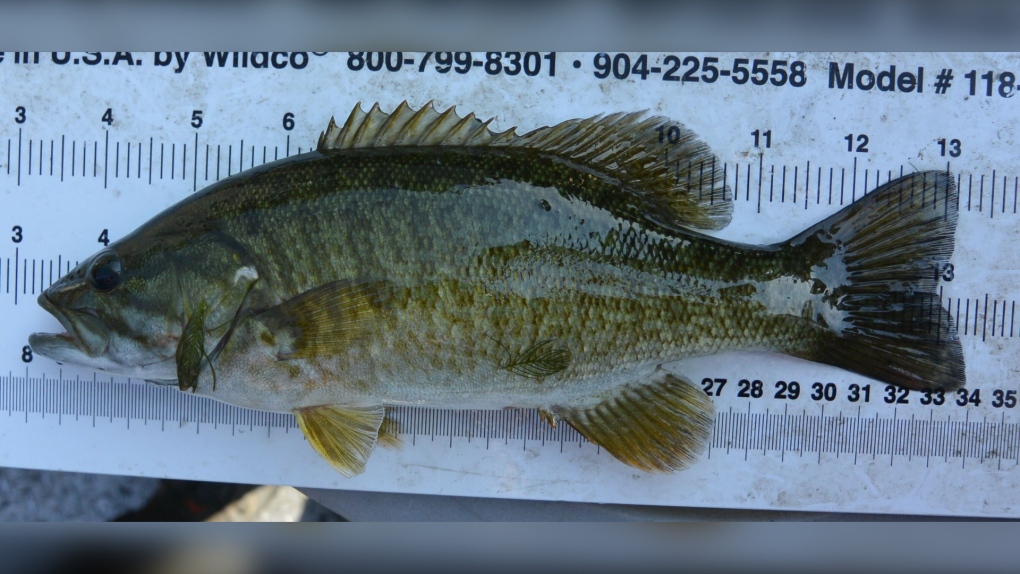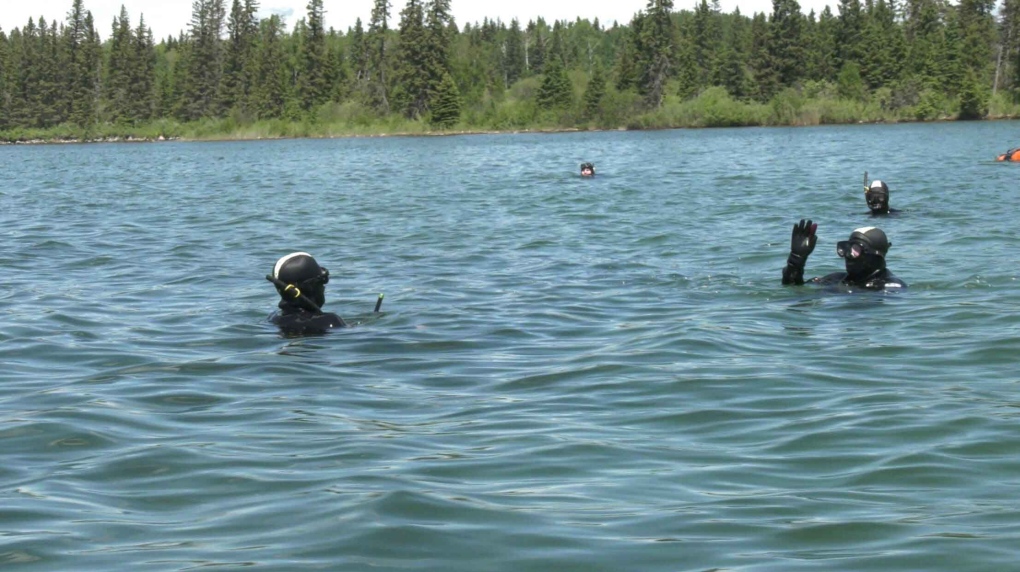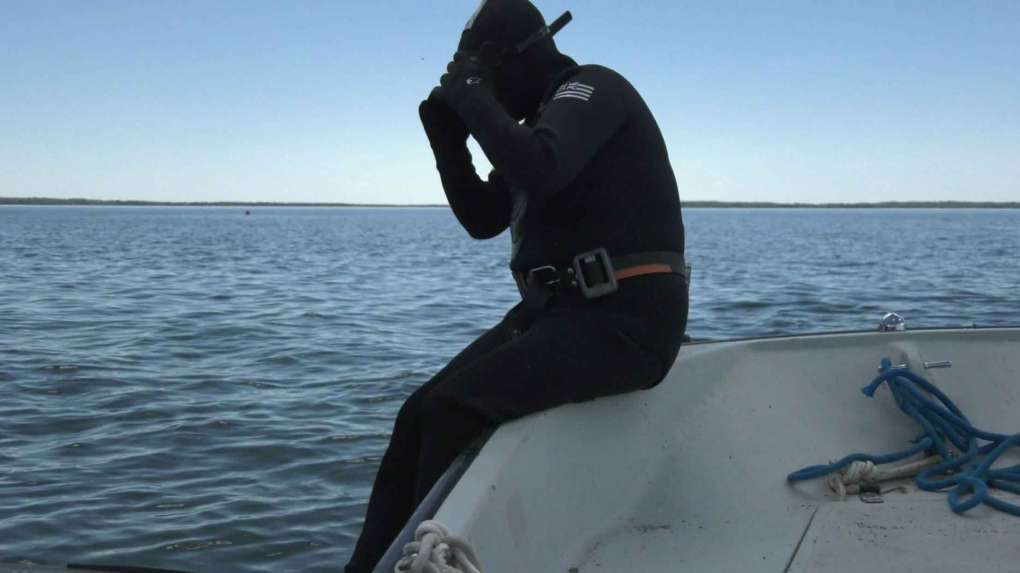First-of-its-kind spearfishing course aimed at controlling invasive species in Clear Lake
A new invasive species in Clear Lake has Parks Canada taking steps to prevent damage to the aquatic ecosystem.
The smallmouth bass is a top predator fish that isn’t typically found in Manitoba.
“They can actually do a lot of damage to aquatic ecosystems through predation and competition,” said Michele Nicholson, an aquatic ecologist with Parks Canada. “They’re really aggressive predators, and they can really impact native fish species.”
Four employees of Parks Canada and four members of the Coalition of First Nations recently completed a spearfishing course at Riding Mountain National Park. The course teaches how to dive and resurface safely, as well as proper spear throwing techniques.
 The smallmouth bass is a top predator fish that isn’t typically found in Manitoba. (Image Source: Fisheries and Oceans Canada)
The smallmouth bass is a top predator fish that isn’t typically found in Manitoba. (Image Source: Fisheries and Oceans Canada)
Robyn Bone, one of the course participants, says the course challenged her both physically and mentally.
“It’s the mental part of when you are under the water and the fact that it’s hard to breathe,” she says. “And physically, it takes a lot of effort and energy to do what you need to do.”
 Four employees of Parks Canada and four members of the Coalition of First Nations recently completed a spearfishing course at Riding Mountain National Park. (Image Source: Parks Canada)
Four employees of Parks Canada and four members of the Coalition of First Nations recently completed a spearfishing course at Riding Mountain National Park. (Image Source: Parks Canada)
This course is the first of its kind in Canada, as Nicholson says research on spearfishing in freshwater hasn’t been done before.
“Spearfishing has been used a lot for invasive species in the ocean, but not in freshwater,” she says, adding that Clear Lake’s ecosystem makes it ideal for this kind of population management.
“The water here is really clear, where a lot of freshwater lakes are not. Smallmouth bass nest in shallow water, so we don’t have to dive really deep. And male bass when they’re nesting, they hang out in one place on their nest, so we could use spearfishing to go in and get them.”
With the course complete, the work to manage the smallmouth bass population will begin in the coming weeks.
Parks Canada says any boaters coming to Clear Lake need to get an aquatic invasive species inspection at Riding Mountain’s boat launch area before anything goes in the water.
 The course teaches how to dive and resurface safely, as well as proper spear throwing techniques. (Image Source: Parks Canada)
The course teaches how to dive and resurface safely, as well as proper spear throwing techniques. (Image Source: Parks Canada)
CTVNews.ca Top Stories

BREAKING Israel attacks Iran, Reuters sources say; drones reported over Isfahan
Israel has attacked Iran, three people familiar with the matter told Reuters, as Iranian state media reported early on Friday that its forces had destroyed drones, days after Iran launched a retaliatory drone strike on Israel.
American millionaire Jonathan Lehrer denied bail after being charged with killing Canadian couple
American millionaire Jonathan Lehrer, one of two men charged in the killings of a Canadian couple in Dominica, has been denied bail.
Nearly half of China's major cities are sinking, researchers say
Nearly half of China's major cities are suffering 'moderate to severe' levels of subsidence, putting millions at risk of flooding especially as sea levels rise.
Prince Harry formally confirms he is now a U.S. resident
Prince Harry, the son of King Charles III and fifth in line to the British throne, has formally confirmed he is now a U.S. resident.
Judge says 'no evidence fully supports' murder case against Umar Zameer as jury starts deliberations
The judge presiding over the trial of a man accused of fatally running over a Toronto police officer is telling jurors the possible verdicts they may reach based on the evidence in the case.
Health Canada to change sperm donor screening rules for men who have sex with men
Health Canada will change its longstanding policy restricting gay and bisexual men from donating to sperm banks in Canada, CTV News has learned. The federal health agency has adopted a revised directive removing the ban on gay, bisexual and other men who have sex with men, effective May 8.
Colin Jost names one celebrity who is great at hosting 'Saturday Night Live'
Colin Jost, who co-anchors Saturday Night Live's 'Weekend Update,' revealed who he thinks is one of the best hosts on the show.
Sports columnist apologizes for 'oafish' comments directed at Caitlin Clark. The controversy isn't over
A male columnist has apologized for a cringeworthy moment during former University of Iowa superstar and college basketball's highest scorer Caitlin Clark's first news conference as an Indiana Fever player.
'Shopaholic' author Sophie Kinsella reveals brain cancer diagnosis
Sophie Kinsella, the best-selling author behind the 'Shopaholic' book series, has revealed that she is receiving treatment for brain cancer.
































